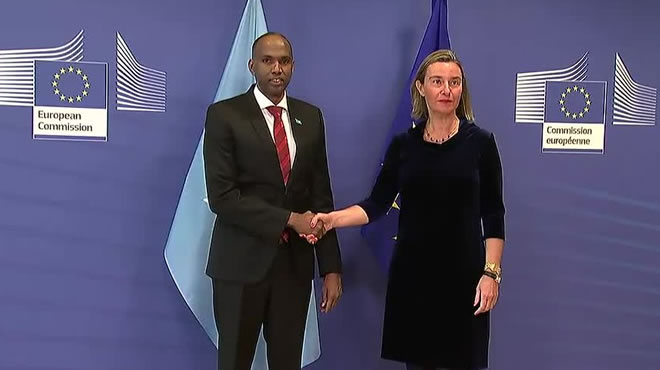by Ibrahim Aden Shire
Tuesday, May 8, 2018

Following the Mogadishu Security Conference of 4 December 2017, H.E. Hassan Ali Khaire and EEAS Deputy Secretary General Pedro Serrano co-chaired the Somalia High-Level Security Meeting on 2 May in Brussels.
In a press conference, shortly after the conference, Prime Minister Hassan Ali Kheyre stated that the European Union agreed to contribute 100 million Euros to Somalia's budget. This is an overdue step taken in the right direction. The international community spends over a billion dollar of humanitarian and developmental aid in Somalia every year. Almost all this money is managed and dispersed by UN agencies and other NGOs. For a long time, the somali government has been requesting some of this money to be channelled through its treasury.
In 2014, donors and Somali government agreed 15% of the Official Development Aid (ODA) being infused into the government budget. The implementation of that agreement was steady but slow. Only 4% and 8% of ODA, for instance, was managed by the treasury in 2015 and 2016 respectively. This is well below the agreed target of 15%. Somalia is the only country where this kind of full control of aid by donors takes place. Other low-income fragile states such as Afghanistan and Central African Republic (CAR) are allowed to manage and disburse substantial amount of ODA. For example, Afghanistan, which is comparable to Somalia in every aspect of governance, 74% of development-focused aid is channelled through Afghan national budget.
It may be assumed that the strong political interest of donors is the main reason they comply with Afghan government’s request. However, other countries such as CAR, Mali and Liberia which have less geopolitical interests of donor governments are doing far better than Somalia when it comes to control of aid and its management. For example, 28% of development-focused aid is channelled through CAR's national budget while the figure is 44% in Mali. This clearly demonstrates that Somalia has been marginalised and unfairly treated when it comes to using country systems.
Using country system is important for state-building and strengthening government institutions. Although The New Deal for Engagement in Fragile States called for increased use of country systems (UCS) in 2011 and Members of the International Dialogue on Peace-building and State-building emphasised the need for greater use of country system, traditional donor government refused to use. While some of them did so explicitly as the UK’s DFID which ruled out any contribution to Somali national budget in 2015, others increased bureaucratic hurdles when using country system for aid delivery. USAID, for example, is required to notify the Congress if any of its funds are to be channelled through country system. Turkey and Saudi Arabia are the only countries which provide direct budgetary support for Somali government.
The reason why donors were so reluctant to use Somali government system was that widespread corruption and mismanagement were rampant in the country in addition to the weak finance system. However, as the World Bank Report (2018) points out donors’ claim was based on outdated figures and guesswork analysis thus, their actions and believe do not reflect the reality on the ground and the progress that the Somali government has made recently.
In fact, Somalia made tangible improvement in the areas of public finance management and met most of IMF’s list if not all. According to IMF, “Somalia’s public finance management is getting closer to international and regional standards and ready to handle a greater share of development assistance”. It further added, “the next set of Staff Monitored Programme structural benchmark, if achieved, will further demonstrate readiness to handle donor funding”.
It could be these positive improvements, in addition to the efforts made by Prime Minister’s Office, which has been pressing donors to use country systems since 2017 London conference, what changed EU’s approach to aid delivery in Somalia.
EU’s pledge, if honoured, is another sign of good governance shown by the current administration. It will help the Somali government to deliver tangible results for its citizens. It strengthens its institutions and allows the government to plan its budget effectively and deliver basic public services to its citizens which, in return, enhance its credibility and perceptions held by its citizens. The EU’s decision, moreover, may influence other traditional donors such the UK and the US and open a new way of dealing with Somali government whose sovereignty has been at stake. All in all EU’s decision to deal directly with Somali government is welcome news.
Ibrahim Aden Shire
[email protected]